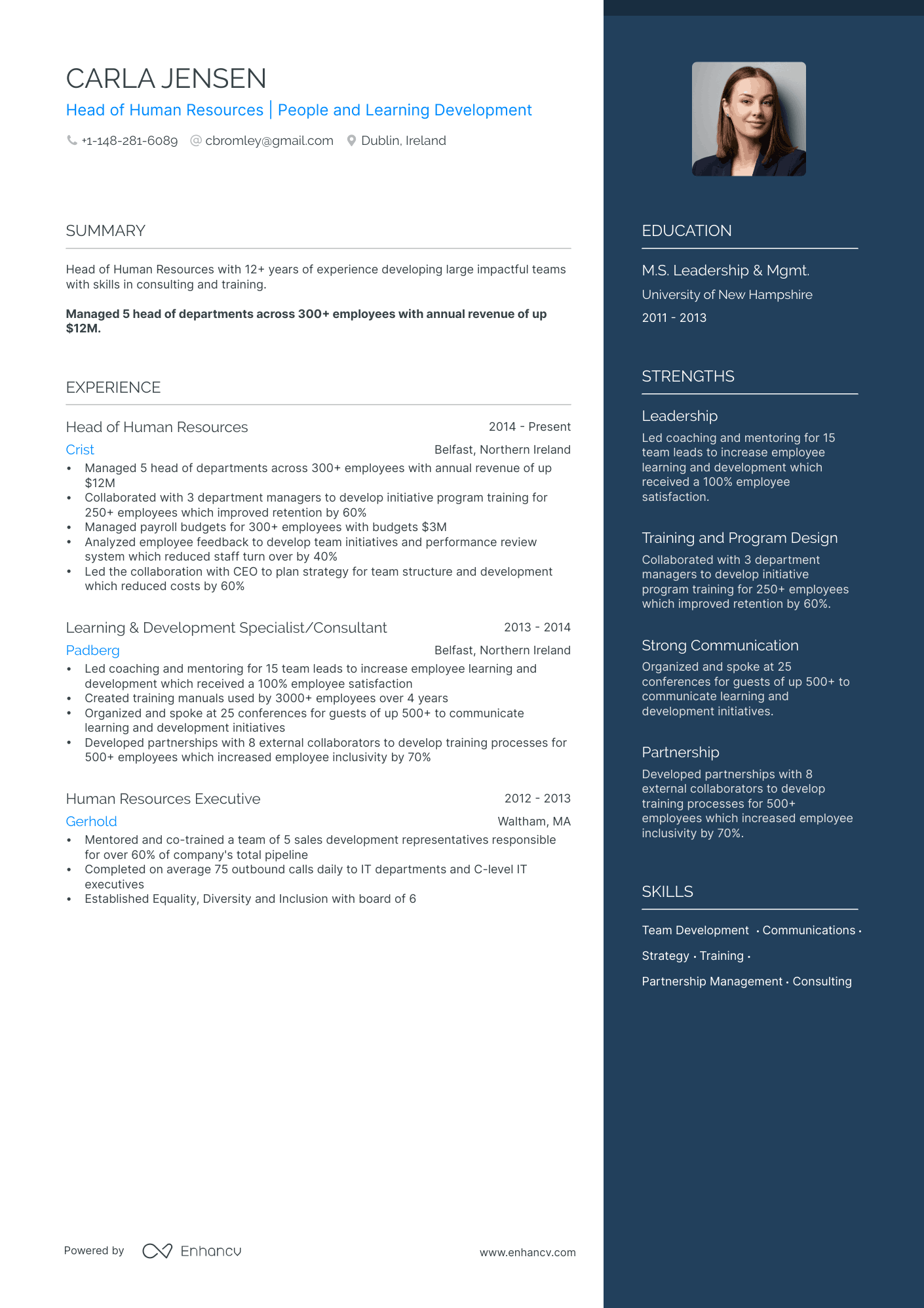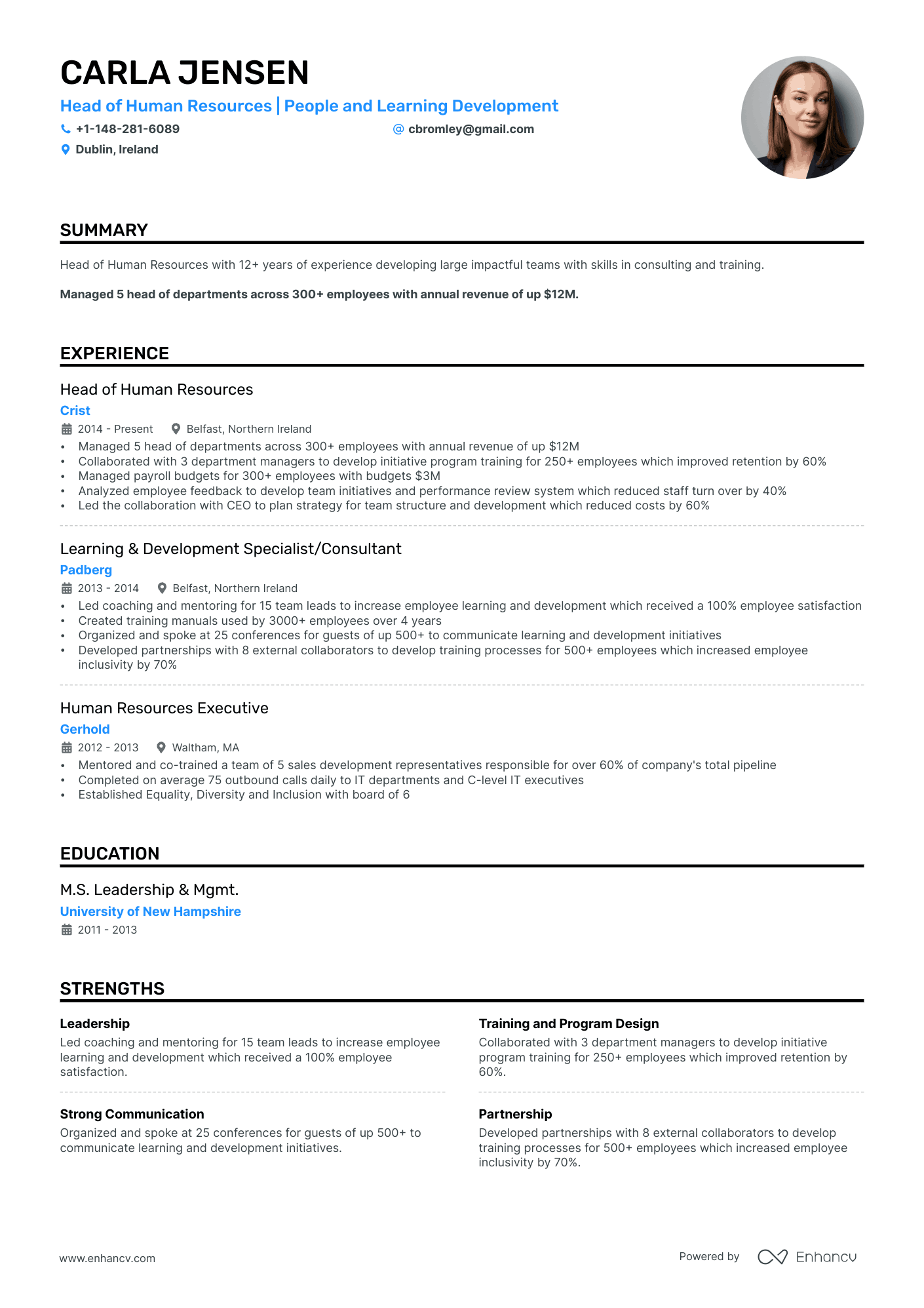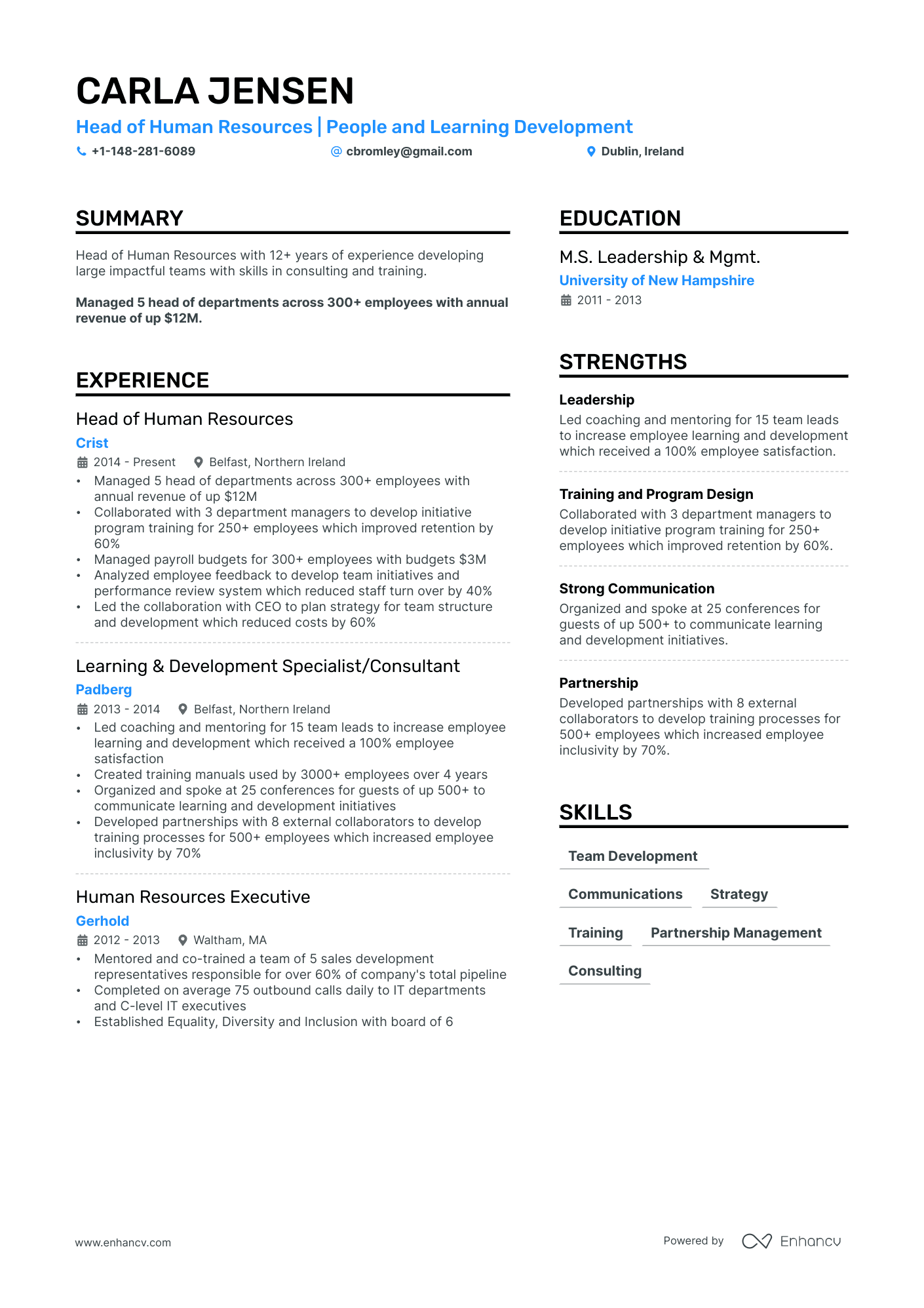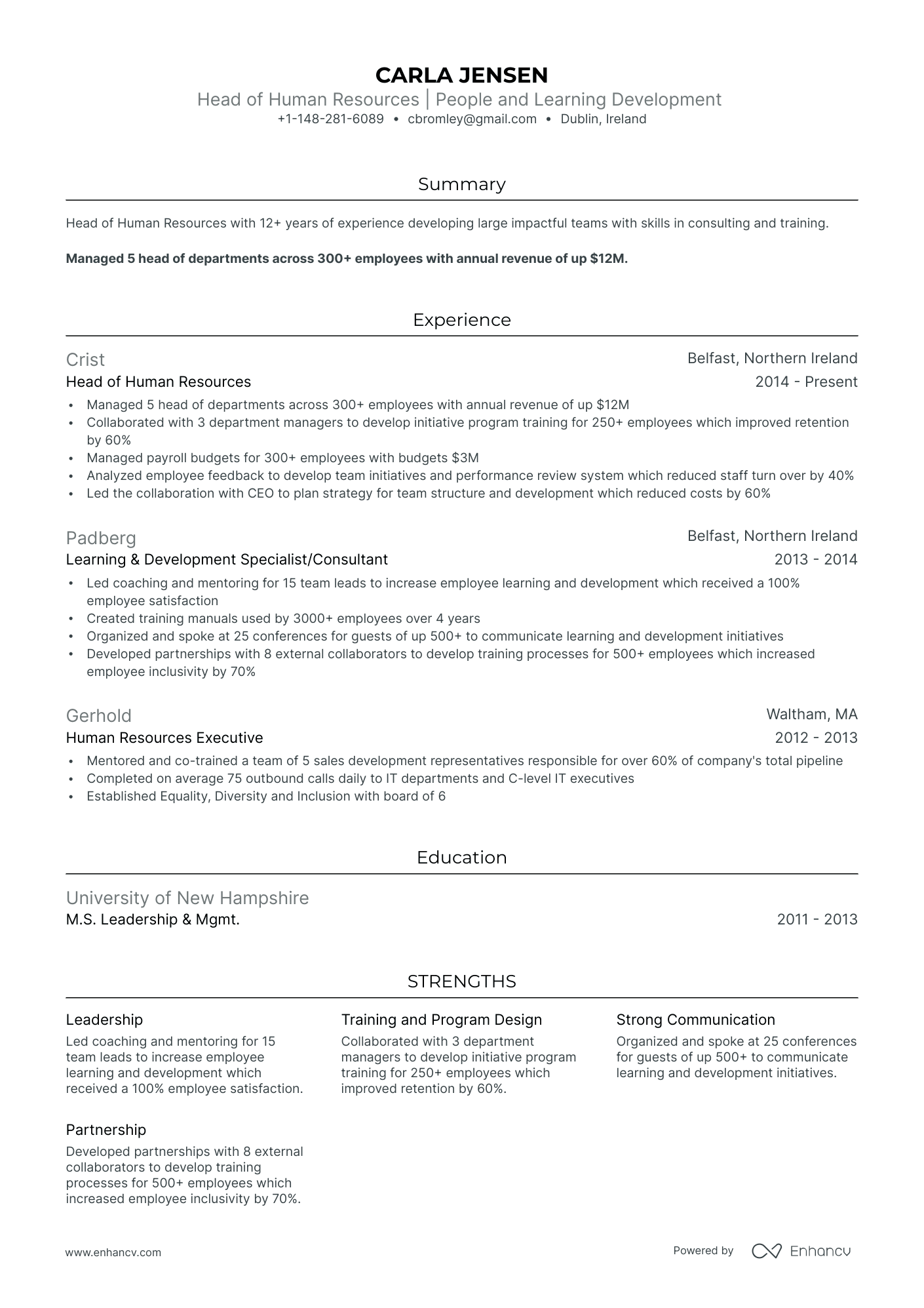Writing an HR manager resume is a unique challenge. As a human resources leader, you know what makes a candidate exceptional—but how do you turn the spotlight on yourself?
In 2026, a generic resume won’t make the cut when you’re up against serious competition, all well-versed in the art of resume writing. The pressure doubles when you realize that your application is, in itself, a testament to your competence as an HR professional.
In this guide, we’ll cover every detail of creating a human resources manager resume to give you an edge against other applicants.
Key takeaways
- Tailor your HR manager resume to the role to align with the hiring company.
- Quantify your achievements with metrics to show your impact.
- Outline a career progression by listing promotions and leadership achievements.
- Prioritize education over certification if you graduated in a relevant subject.
- Resort to additional sections like volunteer work or languages to add value.
First, let’s take a look at what a typical resume of an HR manager looks like.
HR manager resume sample
You can use this example as inspiration and personalize it within the Enhancv resume builder. The best part is our AI feature will provide you with improvement suggestions.
Sarah Johnson
Human Resources Manager
(917) 555-7321 | sarah.johnson@enhancv.com | @LinkedIn | New York, NY
Summary
Dynamic HR manager with over 7 years of experience designing and implementing strategic HR policies, streamlining recruitment processes, and improving employee engagement by 35%. Adept at fostering inclusive workplace cultures and aligning HR goals with organizational objectives.
Experience
HR Manager
Black Star Corporation, New York, NY
March 2018 – Present
- Spearheaded the redesign of onboarding programs, increasing new hire retention rates by 20%.
- Implemented employee feedback systems that improved overall workplace satisfaction by 15%.
- Overhauled HR compliance processes, ensuring 100% alignment with federal and state labor laws.
HR Specialist
TopHire Inc., Boston, MA
June 2015 – February 2018
- Managed recruitment for over 50 roles annually, reducing time-to-hire by 25%.
- Developed training programs that enhanced employee performance by 18%.
- Supported the rollout of a company-wide diversity and inclusion initiative.
Education
Bachelor of Business Administration (Human Resources)
University of Michigan
Graduated: 2015
Certifications
- Senior Professional in Human Resources (SPHR) | 2023
- SHRM-Senior Certified Professional (SHRM-SCP) | 2022
Skills
- Talent acquisition strategies
- Employee relations and conflict resolution
- HR analytics and reporting
- Benefits administration
Languages
- English
- Spanish (Conversational)
However, a lot more goes into building an impressive resume.
How to format an HR manager resume
As you know from experience, formatting your HR manager resume appropriately gives it that sleek professional feel. Also, it’s the first impression a recruiter will get of your organizational skills and attention to detail.
Here’s what we recommend for an HR manager in 2026.
Choose the right resume format depending on your experience
- Use a reverse-chronological format if you’re an experienced HR leader. This way hiring managers will easily see your most recent and relevant experience.
- Opt for a hybrid resume format if you’re transitioning into HR management. It leverages your transferable experience and skills.
Aim for a clean, professional look with subtle design choices
- Keep resume margins between 0.5-1'' for a balanced layout.
- Use resume fonts like Arial, Calibri, or Times New Roman, sized 10 to 12 pt for body text.
- Stick to neutral resume colors like black and dark gray. Dark blue is fine as a subtle color accent.
- Opt for a one-page resume if you have less than 10 years of experience.
Don’t be afraid of the two-column resume format. Our research shows that most modern applicant tracking systems (ATS), especially those powered by AI, have no issues parsing it. In fact, our database shows that the majority of Enhancv users prefer the two-column layout.
Contact information
You’ve seen plenty of resumes to know what a proper header looks like. Here's a quick reminder of what you shouldn’t miss.
- Have your phone number, email address, LinkedIn profile, and location in the header.
- No need to include a resume photo unless it was specified in the job ad.
File formatting and naming conventions
- Save your resume as a PDF file to preserve formatting.
- Use a professional file name like: SarahJohnsonHRManagerResume.pdf
Top sections to include
Structure your resume using these main sections:
- Contact Information
- Summary
- Experience
- Education
- Certifications
- Skills
- Additional sections (e.g., Languages, Volunteer Work, Projects)
Are you confident in your current resume? Give our AI-powered resume checker a try!
Is your resume good enough?
Drop your resume here or choose a file. PDF & DOCX only. Max 2MB file size.
Now that we covered the basics, let’s take a closer look at the most important element of your resume—your work history.
How to write your HR manager resume experience
Writing a strong experience section for an HR manager resume is critical. This is where you show your leadership, strategic impact, and measurable results.
However, conveying the impact of people-focused roles in quantifiable terms can be difficult.
These tips will help you craft a compelling story of your professional experience.
- Keep bullet points concise and to the point.
- Focus on accomplishments, not responsibilities.
- Use specific examples from your experience.
- Start each bullet point with a strong action verb.
- Use numbers and percentages to describe the results you achieved.
- Include keywords and priorities from the job description to pass ATS.
- Mention leadership achievements, such as mentoring staff or project management.
- Highlight strategic contributions like workforce planning, policy creation, or diversity initiatives.
- Cover key HR functions like recruitment, compliance, employee relations, and performance management.
Why resume tailoring is important for HR managers
Tailoring your resume to the role is crucial. As you know, applicants who do it well gain a significant advantage and increase their chances of getting a call from a hiring manager.
By customizing your resume, you:
- Directly address the company’s challenges.
- Demonstrate your ability to align HR initiatives with business goals.
- Show expertise in the organization’s specific industry or sector.
- Signal your understanding of the company’s values and culture.
- Prove your focus on results through metrics and measurable outcomes.
Let’s take a look at a job ad example and see how we can target it afterward:
HR Manager
Location: San Francisco, CA
Company Profile:
Bright Tech Solutions is a cutting-edge technology company headquartered in the heart of San Francisco. We specialize in developing innovative software solutions for startups and enterprises, focusing on AI-driven analytics and seamless integration technologies. Our dynamic team thrives on collaboration, creativity, and a culture that values diversity, innovation, and excellence.
We’re looking for an experienced and motivated HR manager to join our team and drive our people operations strategy. This role will be pivotal in scaling our operations while maintaining our vibrant company culture.
Responsibilities
- Oversee full-cycle recruitment for technical and non-technical roles, ensuring a seamless candidate experience.
- Collaborate with hiring managers to identify and meet workforce needs.
- Develop innovative sourcing strategies to attract top talent in a competitive market.
- Foster a positive and inclusive workplace culture aligned with company values.
- Serve as the primary point of contact for employee concerns and mediate workplace conflicts.
- Design and implement initiatives to enhance employee engagement and retention.
- Lead the performance appraisal process, providing tools and guidance for managers.
- Develop career development programs to support employees’ professional growth.
- Offer training and coaching for managers to enhance their leadership skills.
- Maintain and update HR policies and procedures to align with federal, state, and local labor laws.
- Ensure compliance with relevant regulations, including FMLA, EEO, and OSHA standards.
- Manage visa and immigration processes for international employees.
- Partner with senior leadership to align HR strategies with business objectives.
- Analyze HR metrics and present insights to support decision-making.
- Drive organizational change initiatives and provide expertise on workforce planning.
Requirements
- Bachelor’s degree in Human Resources, Business Administration, or related field (Master’s preferred).
- 5+ years of HR experience, including 2+ years in a managerial role, ideally in a fast-paced tech environment.
- Strong knowledge of HR best practices and employment laws in California.
- Excellent interpersonal and communication skills with the ability to build trust and credibility.
- Proven ability to handle confidential information with discretion and integrity.
- Experience with HRIS platforms (e.g., Workday, BambooHR) and applicant tracking systems.
- Analytical mindset with the ability to interpret data and drive actionable insights.
- Passion for building inclusive and high-performing teams.
- Adaptability and creativity in solving challenges in a fast-changing environment.
- Alignment with Bright Tech Solutions’ mission and values.
We’ve highlighted certain parts of the job description and now we’re going to target them with action verbs and specific examples in the following work experience section.
- •Designed and executed a talent acquisition strategy, reducing time-to-hire by 30% while meeting the demand for niche technical roles.
- •Spearheaded compliance initiatives, ensuring adherence to state and federal labor laws and passing two external audits with zero findings.
- •Developed a data-driven workforce planning model, enabling the business to scale efficiently and achieving a 15% reduction in turnover.
- •Launched an employee engagement program that included mentorship and training, increasing engagement scores by 25% over two years.
- •Championed diversity and inclusion policies, leading to a 20% increase in representation from underrepresented groups within the organization.
This approach enriches your resume with relevant keywords, making it ATS-friendly, and demonstrates your competence to hiring managers. This brings us to our next point.
How to quantify your HR manager experience on a resume
Let’s explore how using numbers in your resume can make your experience more impactful.
Quantifying achievements is one of the best ways to show the value you bring to a business, helping recruiters quickly grasp the scale of your contributions.
Here are five HR manager achievement examples:
- Increased employee retention by 25% over two years through the implementation of targeted engagement initiatives.
- Reduced hiring costs by 18% by introducing an AI-driven applicant tracking system and renegotiating vendor contracts.
- Developed a performance management system that improved employee satisfaction scores by 15% within the first year.
- Managed the onboarding process for over 200 employees, reducing time-to-productivity by 30% with a streamlined training program.
- Spearheaded a diversity recruitment campaign that increased underrepresented hires by 20% across leadership positions.
Having direct experience is certainly a great advantage. But what if that’s not the case?
How to write an HR manager resume with no experience
Writing a compelling HR manager resume without direct experience can be challenging, but it’s achievable with the right strategy.
While it may seem like a disadvantage, you can play to your strengths through your ambition and qualities.
Here’s how to approach it:
- Opt for a functional resume format to emphasize your transferable skills and de-emphasize limited experience.
- Include internships, volunteer work, or part-time roles where you gained HR insights.
- Show your commitment to learning the field with relevant certifications.
- Focus on achievements in previous roles that demonstrate HR-related competencies.
- Mention leadership roles in clubs, organizations, or community groups.
Since you lack direct experience, it’s better to opt for an objective statement rather than a summary.
How to write an objective on an HR manager resume
The primary goal of your objective is to convey your commitment to the role and your eagerness to prove your value to the hiring manager.
Here are the steps you can follow to write your resume objective:
- State your career goal and align it with the company’s mission or needs.
- Mention one or two key skills or experiences that will help you to succeed in the role.
- Focus on specifics that show how you can make an immediate impact.
- Keep it short—two to three sentences that are impactful and easy to read.
Find some inspiration in the following example:
If you lack direct experience but are trying to evolve your career, you’ll find the next section particularly helpful.
Optimize your resume summary and objective for ATS
Drop your resume here or choose a file.
PDF & DOCX only. Max 2MB file size.
How to show career progression on an HR manager resume
If you are looking to move up in your career, then your resume should reflect your career progression.
This allows hiring managers to see your professional growth over the years and your commitment to the field of human resources.
Here are the steps you can take to effectively show your career progression.
- List prior roles like HR specialist, HR generalist, or talent acquisition specialist to show a logical path toward management.
- Explain your past promotions or role expansions to show your growth within organizations.
- Detail how your responsibilities increased over time in your past and current roles.
- Include leadership experiences like mentoring team members or driving organizational change.
However, another aspect that makes career progression notable is the skills you acquire along the way.
How to list your hard and soft skills on your resume
The role of an HR manager requires a unique blend of hard and soft skills.
Hard skills are technical, role-specific abilities, usually acquired through education, training, or certification. Soft skills are personal attributes that shape how you work, communicate, and interact with others. They’re often referred to as "people" skills.
As a human resources leader, you serve as the bridge between upper management and employees while often overseeing a team of HR professionals.
With so much responsibility on your shoulders, having the right set of skills for the job is crucial to prove you can meet and exceed these expectations.
Hard vs. soft skills: What to prioritize on an HR manager resume in 2026?
While both categories are equally important on an HR manager's resume, the recent trend is to create a dedicated skills section for your technical abilities, while integrating your soft skills into your experience section, and summary or objective.
Here’s what hiring managers look for in candidates nowadays:
Best hard skills for your HR manager resume
- Workday
- BambooHR
- ADP Workforce Now
- Kronos
- Paycom
- SAP HCM
- Oracle HCM Cloud
- Ceridian Dayforce
- Taleo
- iCIMS
- Greenhouse
- Zoho Recruit
- Namely
- Gusto
- UltiPro (Ultimate Software)
- Lever
- JazzHR
- ClearCompany
- Jobvite
- PeopleSoft
While tailoring your resume to the job description, pay close attention to any specifically mentioned soft skills and incorporate them into your resume to ensure it’s ATS-friendly.
Here’s what you should look for:
Best soft skills for your HR manager resume
- Communication
- Leadership
- Emotional intelligence
- Conflict resolution
- Decision-making
- Problem-solving
- Time management
- Negotiation
- Coaching and mentoring
- Strategic thinking
- Attention to detail
- Active listening
- Collaboration
- Empathy
- Organizational skills
- Critical thinking
Of course, how you acquired these skills matters as well.
How to list your certifications and education on your resume
Listing your certifications and education appropriately depends on your specific situation. As a general rule, lead with what is most relevant to the HR manager role.
For example, if your degree is specific to human resources, it makes sense to prioritize the education section. However, if a certification better aligns with the job requirements, placing it first is the smarter choice.
What to include in an education entry
There’s no need to go into detail about your school days. Just list the most basic and relevant facts in this order:
- Degree (major and, possibly, minor)
- Institution (University or College name)
- GPA (optional and if above 3.5)
- Year of (expected) graduation
Let’s see how this would look on a resume:
In this example, including the GPA makes sense because the score is impressive and the graduation date is fairly recent. However, if your score isn’t above 3.5, then you can conveniently leave this detail out.
You can also include any relevant coursework you’ve completed, or honors such as cum laude or consistently being on the dean’s list.
What to include in a certification entry
This section is straightforward, but accuracy matters. Ensure you spell certifications correctly for ATS friendliness.
Just list the certification name,the issuer, and year:
However, there is no need to have a separate section if you have just one certificate. Simply mention it in your header or summary to optimize space.
In 2026, these are some of the notable HR certifications:
Best certifications for your HR manager resume
This is optional but if you want to make your entry more engaging, you can briefly mention how you applied what you learned to solve a real-world problem.
For example: “Professional in Human Resources (PHR) — Applied training to streamline recruitment processes, reducing hiring time by 20%.”
However, when it comes to engagement, there’s one section of your resume that truly needs to pack a punch.
How to write your human resources manager resume summary
Generally, it’s best to write your summary last, even though it appears at the top of your resume.
This approach allows you to draw inspiration from your listed accomplishments and craft a compelling statement about why you’re the ideal candidate for the role.
Here’s what you should include in it:
- Number of years in the field
- Core areas of expertise
- One or two accomplishments backed up by numbers
- Alignment with the role
When you’re done, you should end up with a summary similar to this example:
This summary is concise and impactful. In just three sentences, it delivers significant value and captures attention. By structuring your summary this way, you’ll immediately engage anyone reading your resume.
Speaking of value, is there anything else you could add to your resume?
Additional sections for an HR manager resume
Sometimes, including additional sections in your resume can be valuable depending on your circumstances.
For example:
- Volunteer work can help compensate for a lack of direct human resources experience.
- Awards and recognitions demonstrate achievements that may appeal to high-profile organizations.
- Professional affiliations, such as SHRM or HRCI, highlight your commitment to staying active and current in the field.
- Languages will definitely be an advantage if the hiring company operates internationally.
While you might be tempted to list references, this is generally unnecessary for a senior role like HR manager.
In conclusion
Writing a great resume for an HR manager role is no easy task. Every little detail matters. What’s more, you might fall into the trap of overthinking it, causing unnecessary stress. Follow the best practices outlined above, and you’ll surely grab the attention of anyone reading your resume.





